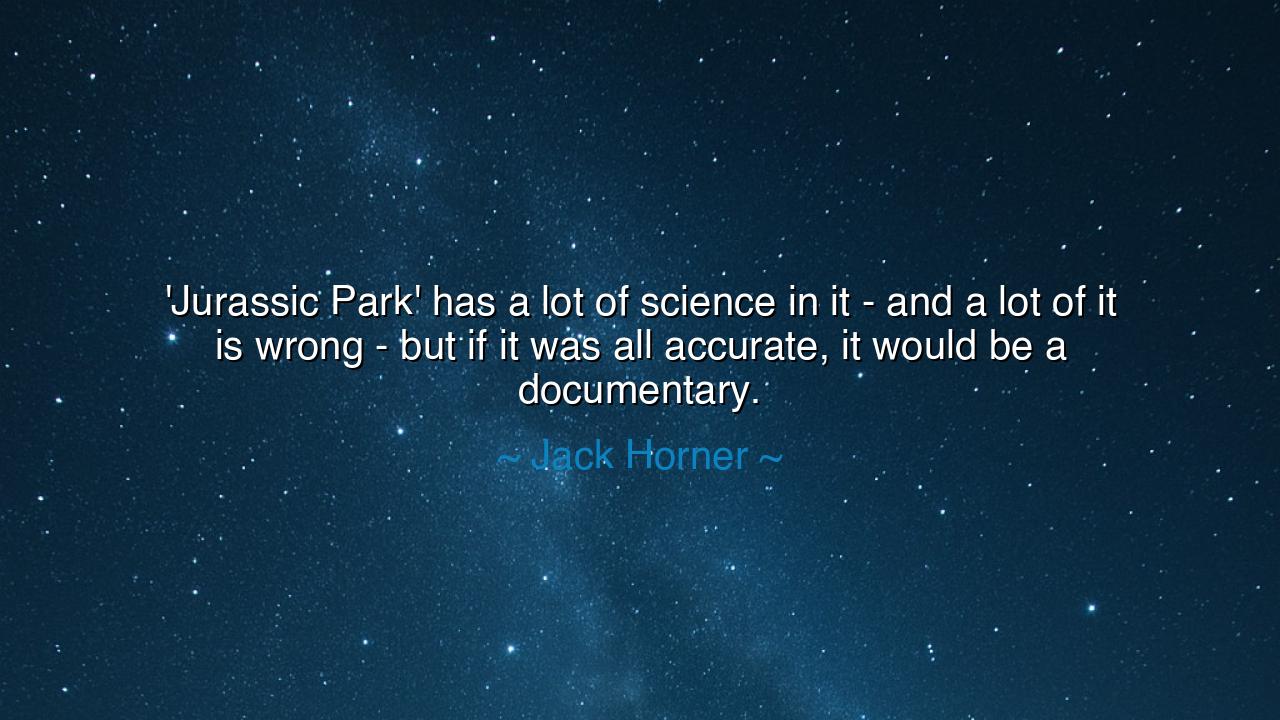
'Jurassic Park' has a lot of science in it - and a lot of it is
'Jurassic Park' has a lot of science in it - and a lot of it is wrong - but if it was all accurate, it would be a documentary.






Hear now, O children of wisdom, for the words of Jack Horner offer us a profound reflection on the relationship between science, creativity, and the pursuit of knowledge. "'Jurassic Park' has a lot of science in it - and a lot of it is wrong - but if it was all accurate, it would be a documentary." In these words, Horner reminds us of a powerful truth: science is not always as neat and clean as the facts we seek, and sometimes, in the pursuit of truth, imagination must step in to carry us to places where reality has yet to take us. Jurassic Park, though based on the solid foundation of scientific principles, also uses the creative power of fiction to explore possibilities that are, at this moment, beyond our reach. It is this tension between fact and imagination that both drives science forward and engages the hearts of those who dream of the unknown.
In the days of the ancients, O children, the line between myth and science was often blurred. Homer, in his epic tales of Odysseus and the gods, wove together the factual and the fantastical in a way that both entertained and educated. Homer's stories were not meant to be literal truths, but explorations of human nature, of morality, and of the forces that shaped the world. Likewise, the early scientists and philosophers of ancient times, like Aristotle and Pythagoras, laid the groundwork for modern science, but their work was deeply intertwined with theories that were based more on speculation than fact. The great discoveries of their time, like the understanding of mathematics and the structure of the universe, were based on ideas that were, in many ways, as imaginative as they were scientific. It was only later that science began to separate from myth and took on the more rigid form we recognize today.
The tale of Galileo Galilei, the great astronomer who first turned the telescope to the heavens and discovered that the Earth was not the center of the universe, serves as a powerful example. Galileo's discoveries were rooted in science, but they shook the very foundations of belief that had been built on centuries of myth and religion. The idea that the Earth was not the center of creation was, in its time, a bold and imaginative leap—a speculative step into the unknown, based on the very principles of observation and hypothesis. While Galileo's work was based on science, it was also visionary, much like the fictional world of Jurassic Park. The truth that Galileo revealed was not fully accepted in his time, and he had to use his imagination to envision a new universe, one that defied the laws that had governed thought for centuries. In this way, science itself is a process of imagination, of daring to look beyond what is known and explore what is yet to be discovered.
Consider, O children, the development of genetic engineering and cloning. At one point, the idea of cloning a living being, of replicating the structure of life itself, was the stuff of science fiction, something that could only be imagined in the minds of creative writers and visionaries. Yet, through the tireless work of scientists and the brilliant application of technology, we now stand on the precipice of such wonders, having already cloned animals and embarked on the journey of human genetic research. The world of Jurassic Park, where dinosaurs are cloned and brought back to life, seemed an impossible fantasy just decades ago. But today, it serves as a reminder that science and imagination are not separate entities. They are intertwined, each fueling the other. Horner's words remind us that, while science seeks to explain the world as it is, fiction pushes the boundaries of what could be.
The lesson from Horner's words is one of vision and hope. While science provides us with the tools to understand the world, it is imagination that leads us to ask the big questions, to push the boundaries of what is known, and to dream of new possibilities. Jurassic Park, though rooted in science, taps into the collective desire to understand the mysteries of life, to unlock the secrets of evolution, and to bring to life creatures long since lost to time. But as with all great stories, the truth of the tale lies not in the literal events, but in the deeper questions it raises about humanity’s relationship with nature, with life, and with technology. It asks us to consider how far we can go in the pursuit of knowledge, and what the consequences might be when we push the boundaries of science too far.
So, O children, take this wisdom to heart. Do not be content with the world as it is, but imagine the world as it could be. Let your curiosity and imagination drive you to explore the unknown, to ask questions, and to seek answers. Know that science and fiction are not enemies, but partners in the great journey of discovery. Imagination can lead us to places where facts have not yet tread, and science can ground those dreams in the reality of what is possible. Let both guide your path, and remember that in the great dance of knowledge and creativity, it is the boldness of the imagination that often pushes the frontiers of science to new heights.






AAdministratorAdministrator
Welcome, honored guests. Please leave a comment, we will respond soon